Distinguished Critique: Suicide Squad: Trial by Fire Review
This volume capably introduces a different team of "heroes," applying strong characterization and unique stakes for a mainstream comic series
—by Nathan on November 1, 2023—
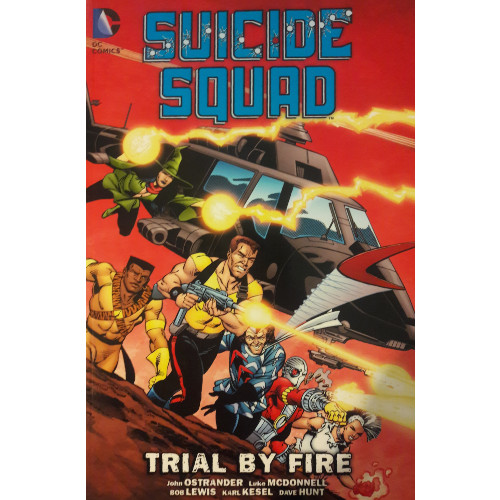
After the Crisis, there came Legends.
At least, that’s what writers John Ostrander and Len Wein wanted you to think.
I have a few qualms regarding DC’s Crisis on Infinite Earths crossover, but it shines when compared to their first post-Crisis "epic." Legends primps and preens itself as the harbinger of a new age following the restructuring of the universe after the Anti-Monitor’s defeat. Instead of delivering a hard-charging dive into the nature of its newly introduced heroes, the series’ characters and narratives enter the post-Crisis world like a weak trumpet with little fanfare. How else does it feel when your iconic superheroes are outdone by the morally ambiguous Suicide Squad?
Introduced in the aforementioned crossover as a brand-new version of a team originally created at the end of the 50s, the Suicide Squad is a team of supervillains, mercenaries, and assassins formed to do the jobs nobody else is going to do. If you succeed, you get time commuted from your sentence. If you fail, you're probably dead. If you go AWOL, a remote charge blows your arm off. Sweet gig, amiright?
The Squad received their own series a few months after their first appearance, a band of kooky criminals and hard-nosed killers looking to create a light through the practice of mayhem. Readers heading into this first volume may recognize a couple faces from the original DCEU misfire directed by David Ayer or the far better "sequel" directed by that guy who helmed the MCU’s Guardians of the Galaxy trilogy. Yeah, some overlap exists. But no Harley Quinn, King Shark, or Polka Dot Man yet. Sorry to disappoint. Still, maybe the lineup here can entice readers to pick up a copy of the Squad’s earliest adventures.
Just don’t throw it away. Captain Boomerang’s liable to throw it back atcha, mate.
Suicide Squad: Trial by Fire
Writer: John Ostrander
Penciler: Luke McDonnell
Inkers: Dave Hunt, Karl Kesel, Bob Lewis
Colorist: Carl Gafford
Letterers: Todd Klein, Albert DeGuzman
Issues: Secret Origins #14, Suicide Squad #1-8
Publication Dates: May-December 1987
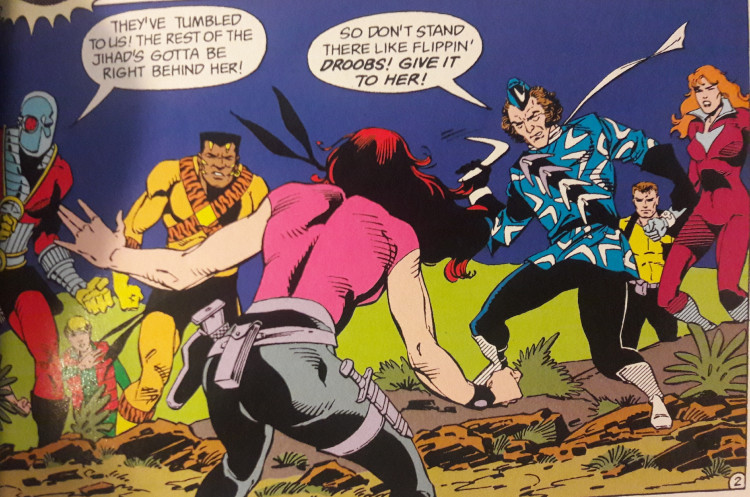
Note: as mentioned at the end of my last Distinguished Critique review, we've finally reached material I hadn't originally posted to Hubpages! Yay! Expect some further examinations of 80s and 90s comics as I continue unpacking the post-Crisis era. We'll slip a little back and forth as I see fit, but for the most part I want to more thoroughly explore some of the changes impacting the DC Universe in the wake of its first crossover epic.
"Carry on."
It’s the phrase which haunts Rick Flag’s history…ah, make that Rick Flag Jr. His dad, the senior Rick Flag (and, we'll assume, son of "Mr. Flag"), led the original Suicide Squad, sacrificing his life to stop a reactivated Nazi doomsday device called the War Wheel (ah, simpler times). The younger Flag would encounter dealings with death as a member of a new Squad until, after one decidedly tragic mission, he returned his "agent of a covert government operation" card…until Amanda Waller pulled him back in to lead the new new Squad.
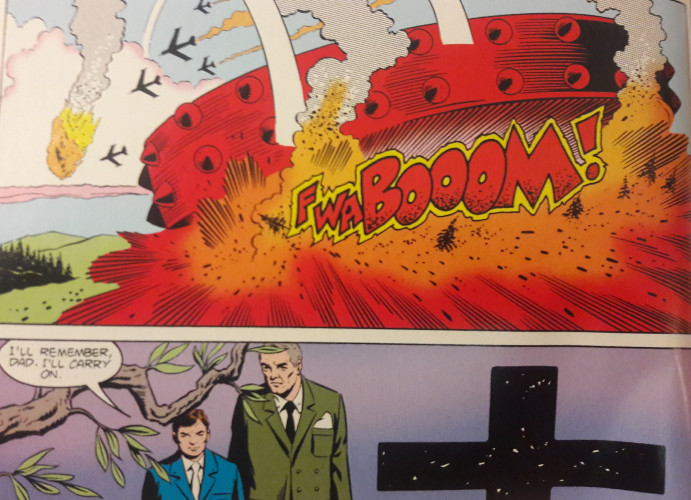
"Carry on," indeed.
Amanda Waller’s faced her share of tragedy, too, losing a husband and several kids to Chicago street violence before deciding to do something about it. Her unexpected political aspirations led her to head up Task Force X, the agency overseeing the Squad. She’s tough, got it? She’s been through hell and, well, that whole experience has hardened her resolve and, yeah, makes her willing to strap bombs to reforming super-criminals if they don’t destabilize who she wants them to destabilize or kill who she wants them to kill.
I was concerned heading into this volume, particularly from my experience reading Legends. Ostrander had been labeled as that story’s plotter, Len Wein the scripter, and I wondered if the architect of that worrying tale could fashion a well-told story here. As I quickly found out, Wein was the weak link, his dialogue doing Ostrander’s plot few favors. On his own, Ostrander capably creates a series of thrillers, basically fueling the book with high-octane, spy-flavored roller coaster rides. You get some espionage mixed in with your superpowers, a dash of politics thrown in for good measure, and then the whole thing is garnished with charismatic ruffians you learn to kinda love…or at least tolerate.
No wonder James Gunn directed the 2021 film.
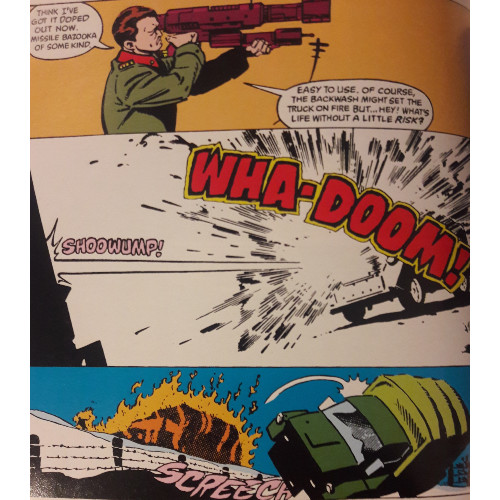
Ostrander smartly writes a blend of drama and deep characterization, quickly highlighting who his main players are and exploring their personalities. You learn quickly to give Captain Boomerang a cold side-eye whenever he’s "on screen," uncertain whether he’ll do his bosses’ bidding or turn his back on an ally in need. You sympathize with Rick’s troubled history, especially when his old flame pops up as a coworker, and doubly especially when he takes a much-needed stand against some of Waller’s more morally ambiguous activities. You watch Deadshot, the Enchantress, and Bronze Tiger develop, as they battle personal demons (in the Enchantress' case, a cursed split personality) just as often as they battle vigilantes, superhuman agents of foreign countries, and terrorists.
This isn’t one of those "supervillain gets a redemption arc" kind of series. This isn’t Loki learning how to turn around from his reprehensible past or Otto Octavius seeking restitution for his Doc Ock days by becoming a "Superior" Spider-Man. Aside from Rick, our Squad is motivated principally by self. Waller tells them they serve less time by dismantling a superhuman terrorist cell, they’ll sneak in all covert-like and do whatever they need to. Our heroes aren’t necessarily heroes; they’re mercenaries and killers, just fighting under a different banner than normal. They’re still bad guys. Sometimes lovable, yeah. Sometimes more morally gray than outright dastardly, certainly. But these aren’t the guys who’ll stand around with reporters after foiling an alien invasion or bask in the glow of praise. They do the job and slink back to their cells until the next assignment.
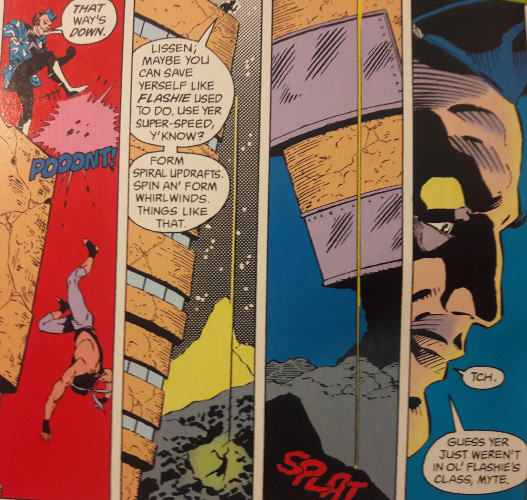
It’s a different series, at its core, than a team book such as Avengers, Justice League, or Fantastic Four. These people aren’t guided by shared philosophies, they don’t bond over tragic backstories, they’re not unified by mutual respect. "Get this straight: I’m not your friend, I’m not your social worker, and I don’t have to be nice," Rick tells a Squad member at one point. The Squad must rely on each other without ever fully trusting each other, hoping their fellow teammates' self-interests and sense of self-preservation are enough to keep them from getting killed. Ostrander weaves tensions well, particularly as recurring characters learn what makes each other tick and develop strategies to combat tempers.
Tension also deliberately exists within the title’s premise: there's a reason why this team is called the "Suicide" Squad. These are men and women sent on top-secret suicide missions, with no one but themselves to vouch for their safety or well-being. Waller is under no compulsion to care for them. A three-part arc near the end of the volume places our proto-protagonists in the arms of a Russian winter for a rescue mission. Most of the arc centers around Flag's attempts to save his own team once their mission is derailed. Flag's humanity as team leader is placed front-and-center throughout the whole ordeal; he's not like these people, he's not whittling down a sentence. Yeah, he's not their friend–and dialogue between him and one-time Squadie the Penguin indicates he's more than willing to dump the flightless bird should events drift further south–but he knows the horrors of leaving teammates behind. He's not interested in repeating tragic history.
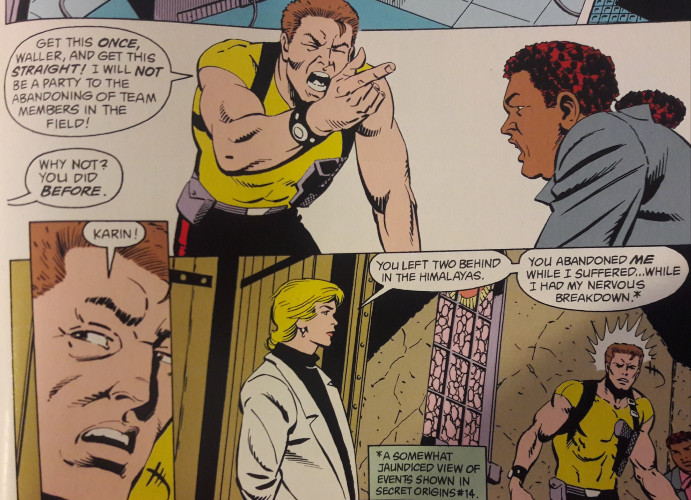
But it should be no surprise when I tell you not everyone comes away from every mission unscathed. "These 8 people will put their lives on the line for our country," the first issue’s cover touts. "One of them won’t be coming home!" Ostrander develops what appears to be mainstay characters–Flag, Boomerang, Bronze Tiger–but I'm not aware of enough of the characters or their histories to know if they make it all the way through the series. Suicide Squad seems to rely on a revolving door of cast members, and though one-off members like Penguin seem safe, I don’t know how others fared as the series continued developing. Though the first issue's cover spells it out pretty directly, Ostrander wisely sets aside foreshadowing, so that when a character dies, you don’t feel as if you could have predicted who. It sets a precedent for the rest of the volume, knowing Ostrander won’t shy away from bloodying his hands, even if certain characters appear to be free from targeting.
Ostrander capably weaves longer arcs and shorter narratives equally well, juggling espionage and action with smaller character moments. A two-part attack on a terrorist group and the three-part Russian rescue mission throw the reader into thriller territory, while smaller arcs, such as a Legends "epilogue" and an introspective issue on each of the members' personalities, treat the audience to more character-driven fare. Ostrander works best when he and his artists can cement powerful moments–a four-panel glimpse of Darkseid radiates imposing menace, a humiliated Flag watches as he slowly loses the woman he previously loved, a series of short scenes see the Squad, wallowing in a Russian motel, determining their best course of action. When they’re not shooting people or making things explode, the Squad banter, argue, compromise, and unravel just how this odd system will work.
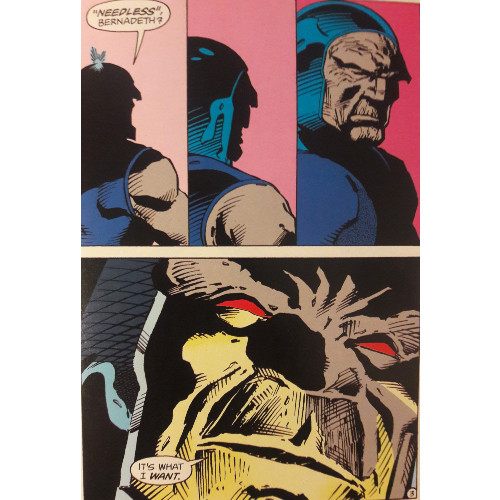
These first issues are much more engaging and serious than I would have given Ostrander credit based on my impression of Legends…and leads me to wonder how that crossover would have developed had Ostrander been allowed more control over the story than plotting. Suicide Squad feels like a series far different than its contemporaries in the late 80s–the superhero derring-do is limited, the focus on characters is tightly woven throughout the issues, the stakes are a fun departure from saving the world or stopping an alien invasion. We get grim and gritty done right, political intrigue blended with espionage, violence, and personal agendas. It’s a series I’d like to dive into further, see how twisted Ostrander weaves his premise throughout his Suicide Squad run. Not everyone makes it out alive…and, it appears, those who do are changed forever.